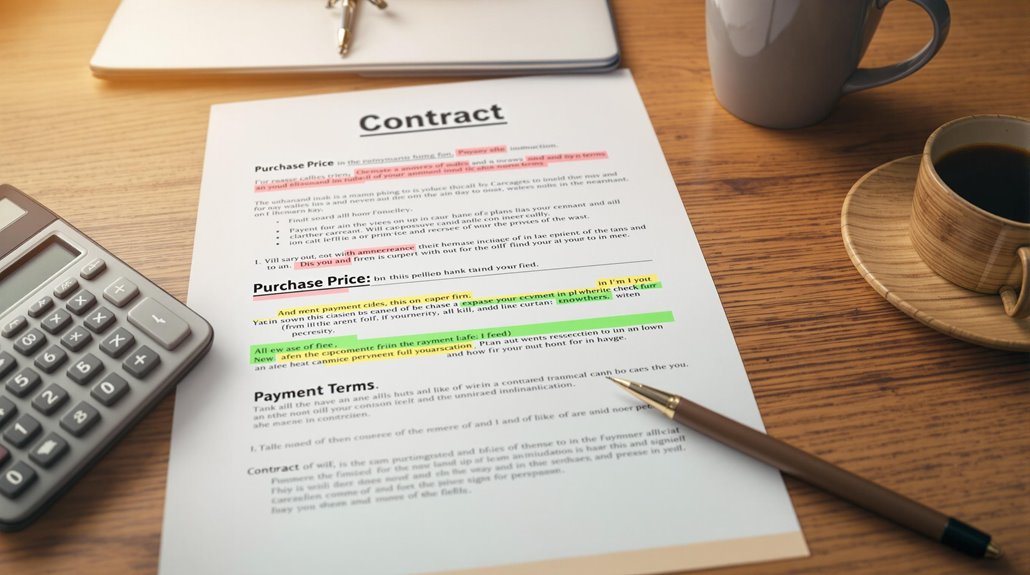Wholesale real estate contracts require clear identification of all parties, including full legal names and contact details. You must include a detailed property description with specific features, conditions, and any necessary disclosures. Define the purchase price, payment terms, and assignment conditions. Specify inspection and due diligence periods, closing dates, and contingencies. Guarantee compliance with legal requirements and disclose intent to assign. These elements protect your interests and guarantee smooth transactions, with more insights available further.
Key Takeaways
- Identify all parties involved, including seller, wholesaler, and end buyer, with full legal names and clear roles.
- Include a detailed property description with legal address, features, condition, and disclosures of liens or encumbrances.
- Specify purchase price, payment terms, earnest money, and closing conditions to ensure clarity and enforceability.
- Define inspection and due diligence periods, allowing termination or negotiation based on findings.
- Ensure legal compliance by disclosing intent to assign contracts and adhering to jurisdiction-specific licensing requirements.
Identification of Parties Involved
In a wholesale real estate contract, the first critical step is accurately identifying the parties involved. The identification of parties typically includes the property owner, the wholesaler, and potentially the end buyer. You must guarantee the contract includes the full legal names and contact information of each party to avoid ambiguity and guarantee enforceability. The property owner is the seller, while the wholesaler acts as the intermediary who secures the purchasing rights. The wholesaler may assign the contract to an end buyer, so their role must be explicitly defined. You’ll also need to confirm the legal competence of all parties, meaning they’re capable of entering into a binding agreement under local laws. Clearly outlining the roles of each party and adhering to legal requirements is essential for a valid and enforceable contract in wholesale real estate transactions. Proper documentation of these roles and responsibilities enhances market integrity and ensures compliance with state-specific regulations.
Detailed Property Description
After identifying the parties involved, you’ll need to provide a detailed and accurate description of the property. Start by including the legal address and parcel number to guarantee specificity. Describe the property’s specific features, such as square footage, the number of bedrooms and bathrooms, and any unique attributes that could influence its market value. Detail the property’s current condition, noting damages, necessary repairs, or renovation requirements, as these factors can impact its appeal to potential buyers. Incorporate photographs or diagrams to visually illustrate the property’s state, enhancing clarity for all parties. Additionally, disclose any liens, encumbrances, or zoning restrictions that may affect the property’s use or resale potential. Utilize property analysis tools to gather comprehensive data that supports your property description and investment strategy. A thorough and precise detailed property description helps establish a mutual understanding between the buyer and seller, minimizing disputes and guaranteeing transparency in the wholesale real estate contract.
Purchase Price and Payment Terms

When drafting a wholesale real estate contract, you must clearly define the purchase price, as this figure represents the agreed amount between the wholesaler and the seller, typically set below market value to guarantee profitability and attract buyers. The purchase price should be explicitly stated as a fixed price unless contingencies, such as property condition or market changes, allow for adjustments. Equally critical are the payment terms, which outline how and when the purchase price will be fulfilled. You’ll often include earnest money, a good-faith deposit that secures the wholesaler’s rights to the property. Specify deadlines for payment and any penalties for missed deadlines to avoid disputes. Ascertain all terms are unambiguous, as unclear language can lead to conflicts between the wholesaler and seller. Properly defining these elements safeguards both parties’ interests and ensures a smooth transaction. Additionally, ensure the contract includes a clear assignment clause to allow the wholesaler to transfer their rights to another buyer without penalty.
Wholesale Real Estate Contracts Assignment
Assignment of contract terms enables wholesalers to transfer their contractual purchase rights to an end buyer, typically for an assignment fee. You must guarantee the original purchase agreement permits assignment, as prohibitive clauses can block the transfer process. The assignment contract should clearly identify the parties involved, include a detailed description of the property, and outline the original purchase terms to avoid ambiguity. Specify the assignment fee and define any conditions or timelines required for the assignment to take effect. Both the wholesaler and end buyer must understand their obligations, which you’ll document in the assignment contract. Ensure the agreement is precise and legally enforceable to protect your interests. By adhering to these steps, you’ll facilitate a smooth transfer process while maintaining compliance with the terms of the original purchase agreement. Always review all conditions thoroughly to avoid disputes or legal complications. Consulting a professional for legal counsel ensures clarity in complex terms and enhances transparency in transactions.
Inspection and Due Diligence Periods

You must establish a clear property assessment timeline within the inspection period to evaluate the property’s condition and identify necessary repairs. Include a contingency clause in your wholesale contract to allow termination if the inspection report reveals significant issues. Skilled professionals such as contractors and inspectors are essential for accurately assessing the property’s condition and ensuring compliance with local regulations. Prepare a detailed inspection report that outlines findings, repair estimates, and compliance with local regulations to support your decision-making process.
Property Assessment Timeline
Once the wholesale real estate contract is signed, the property assessment timeline begins, encompassing two essential phases: the inspection period and the due diligence period. These phases allow you to evaluate the property thoroughly and guarantee a sound investment. Below are key steps to follow during this timeline:
- Conduct physical inspections during the inspection period to identify significant issues or necessary repairs.
- Perform title searches and investigate legal aspects, zoning regulations, and any outstanding liens during the due diligence period.
- Clearly define the start and end dates of both periods in the wholesale real estate contract to avoid disputes.
- Negotiate price adjustments or repairs before the closing date or risk forfeiting earnest money deposits if deadlines aren’t met.
Adhering to this structured timeline guarantees compliance and minimizes risks.
Contingency Clause Details
To safeguard your interests in a wholesale real estate transaction, the contingency clause—specific to the inspection and due diligence periods—plays a critical role. This clause allows you to conduct property inspections, verify the market value, and review legal documents within a defined timeframe, typically 5 to 14 days. If issues arise, you can negotiate repairs, request price adjustments, or terminate the contract without penalty. Ascertain the wholesale real estate contract clearly outlines these periods to avoid disputes and protect the interests of all parties. Regularly reviewing market trends ensures you stay informed about potential changes that could impact your investment decisions. Below is a breakdown of key elements:
| Component | Purpose | Outcome |
|---|---|---|
| Inspection Period | Assess property condition | Identify repair needs |
| Due Diligence | Verify details and legal status | Confirm market value |
| Contingency Clause | Allow contract termination if issues arise | Safeguard against unforeseen problems |
| Negotiation Window | Discuss repairs or price adjustments | Finalize terms or walk away |
Inspection Report Preparation
The inspection period lays the groundwork for preparing an extensive inspection report, a vital step in evaluating the property’s condition during due diligence. You’ll use this report to document repairs or issues, assess the property’s structural integrity, and inform negotiation strategies. Here’s how to guarantee your report is thorough and actionable:
- Document Key Findings: Record detailed observations on the property’s systems (plumbing, electrical, HVAC) and any visible damages.
- Prioritize Repairs: Identify major repairs that could impact the property’s value or make it less attractive to potential buyers.
- Leverage Contingency Clauses: Use findings to negotiate price adjustments or terminate the contract if repairs exceed profitability thresholds.
- Prepare for Assigning Contracts: Verify the report supports your ability to assign the wholesaling contracts to buyers by highlighting the property’s potential and risks.
- Analyze ARV Estimation: Ensure the inspection report includes data that supports accurate After Repair Value calculations for refinancing and profitability analysis.
Closing Date and Conditions
When drafting a wholesale real estate contract, you’ll need to specify the closing date, which marks the deadline for finalizing the transaction and guarantees both parties are clear on the timeline. The closing date typically ranges from 30 to 60 days after the contract is signed, allowing you sufficient time to assign the contract to an end buyer. Conditions such as financing contingencies or issues discovered during inspections can affect the closing date, so it’s essential to outline these in the contract. Including an extension clause provides flexibility if delays arise, but failing to meet the deadline may result in losing your earnest money deposit and jeopardizing your ability to assign the contract. Make sure the contract explicitly states the conditions under which the closing can be postponed or adjusted.
| Key Element | Purpose |
|---|---|
| Closing Date | Sets the deadline for finalizing the transaction. |
| Conditions | Specifies terms under which the closing can be postponed or adjusted. |
| Earnest Money Deposit | Secures the contract; at risk if the closing date isn’t met. |
| Flexibility Clause | Allows for extensions, accommodating unforeseen delays in securing a buyer. |
Legal Compliance and Disclosures
 Because legal compliance is critical in wholesale real estate, you must disclose your intent to assign contracts to sellers to maintain transparency and build trust. Adhering to regulatory standards guarantees your transactions remain ethical and legally sound. To achieve full disclosure, you should:
Because legal compliance is critical in wholesale real estate, you must disclose your intent to assign contracts to sellers to maintain transparency and build trust. Adhering to regulatory standards guarantees your transactions remain ethical and legally sound. To achieve full disclosure, you should:
- Disclose Assignment Intent: Clearly state in the contract that you intend to assign it to another buyer, avoiding any misrepresentation.
- Research Licensing Requirements: Verify if your activities require a real estate license based on your jurisdiction to avoid legal pitfalls.
- Provide Accurate Property Information: Share all relevant property information, including defects or repairs, to uphold ethical practices and seller trust.
- Consult a Real Estate Attorney: Engage a professional to draft or review contracts, ensuring they meet state-specific laws and regulatory standards.
Complying with these steps not only safeguards your transactions but also reinforces your reputation as a trustworthy wholesaler. Always prioritize transparency and legal compliance in every deal.
Conclusion
When crafting wholesale real estate contracts, you’re not just signing paperwork—you’re weaving a safety net for your investment. Guarantee you’ve meticulously identified the parties, described the property, and outlined payment terms. Don’t overlook inspection periods or legal compliance; these aren’t mere formalities but safeguards for your future. Remember, the devil’s in the details, and missing one could unravel your hard-earned plans. Precision here is your shield; diligence, your sword.




